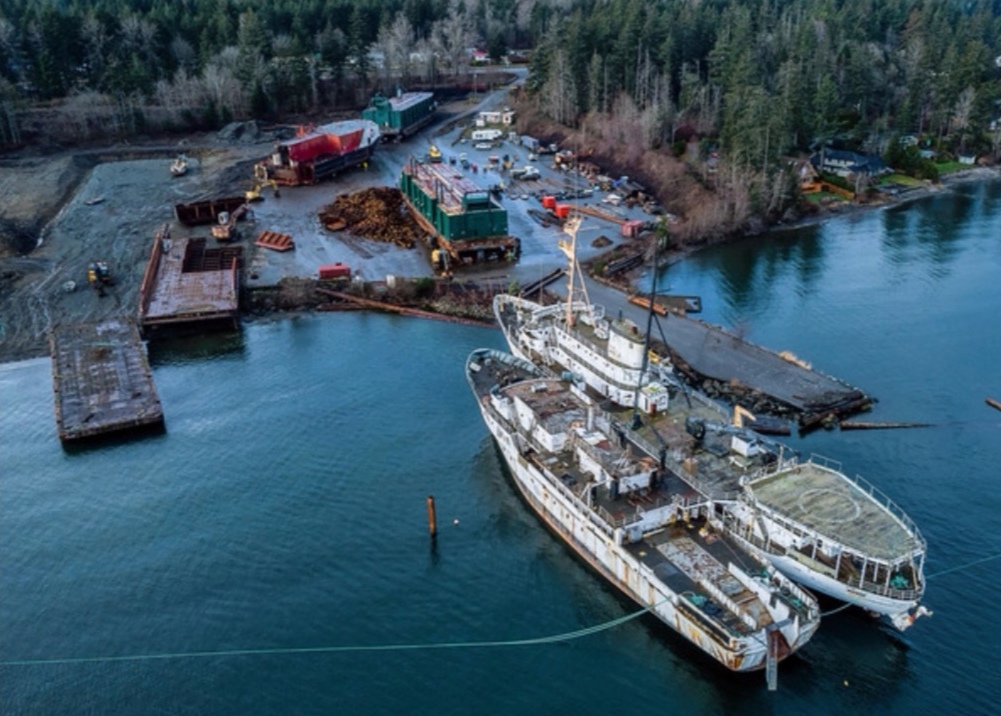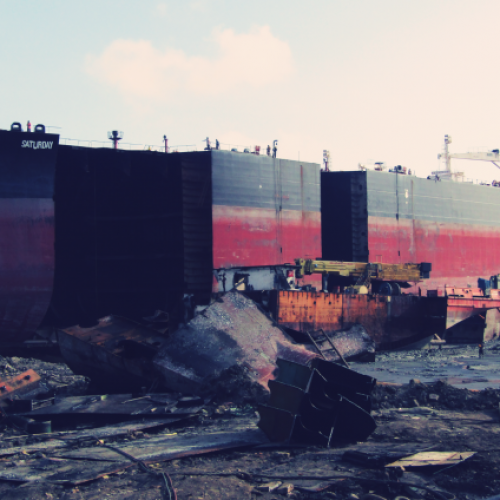Press Release – NGOs join local residents and First Nations in fight against toxic shipbreaking in British Columbia
Eighteen months have passed since local residents and K’ómoks First Nation (KFN) first raised concerns regarding scrapping operations at Union Bay, traditional unceded territory of First Nations within Baynes Sound, British Columbia, Canada. Now, the NGO Shipbreaking Platform joins them in calling on federal, provincial and regional authorities to make sure that the activities carried out by the operator, Deep Water Recovery Ltd (DWR), cease to cause harm to both local communities and the surrounding environment.
In December 2020, DWR converted a former log-sort location in an improvised shipbreaking yard to pull apart barges. The shipbreaking activities are in violation of district zoning bylaws, and, to date, the Comox Valley Regional District is still allowing for hazardous operations to take place only a few meters away from several residential houses and within an Ecologically and Biologically Significant Area (EBSA).
As highlighted in a recent report by WWF Canada, Baynes Sound is the highest ranked cumulative and spawning area for herring in the Strait of Georgia and is a critical feeding and overwintering area for water birds. It also supports the highest density of intertidal shellfish aquaculture in British Columbia, producing over half of all the shellfish cultured in the province. Locating a hazardous industry in such an ecologically sensitive zone is simply unacceptable.
Despite the foreign management of DWR stating that very stringent environmental plans are in place, drone footage and photos of the site tell a story of vessels taken apart without impermeable flooring and drainage systems in place. No Environmental Impact Assessment or public consultation prior to the dismantling activities having started was conducted.


Indeed, shipbreaking activities conducted without full containment can easily pollute land, water and air, as ships are almost invariably contaminated or containing harmful materials in their structures. Recent studies have shown how unregulated scrapping can cause carcinogenic air pollution, loss of marine biodiversity and soil contamination. Furthermore, lack of proper infrastructure and access to emergency equipment puts the lives of workers at risk in case of an accident during the dismantling process.
Currently, two former US Government vessels and a BC Ferries Corporation’s passenger ship are moored at Union Bay, possibly waiting to be scrapped. The NOAAS Miller Freeman (R 223), NOAAS Surveyor (S 132) and Queen of Burnaby, given their age and type, are likely to contain high amounts of toxic substances in their structures, including asbestos and PCBs.

The NGO Shipbreaking Platform has recently sent an official letter of concern to all Canadian competent bodies, and stands ready to further assist the affected communities in their fight for environmental justice.
Related news

Platform News – Norwegian pension funds turn their attention towards Indian shipbreaking practices
Last week the Council on Ethics of the Norwegian oil pension fund (Government Pension Fund Global) announced that it will turn its attention towards Indian shipbreaking practices…. Read More

Press Release – Platform publishes list of ships dismantled worldwide in 2018
744 large ocean-going commercial vessels were sold to the scrap yards in 2018. Of these vessels, 518 were broken down on tidal mudflats in South Asia.
... Read More
Platform News – Prison sentence for attempted illegal export of the Harrier reveals reckless actions by all parties involved
The judgment, now available in English, provides shocking insights into the role played by all parties involved in the sale and transport of the end-of-life vessel.
... Read More
Press Release – Controversial Tide Carrier under arrest in Norway
After having been informed by the NGO Shipbreaking Platform and its member organisation Bellona that the TIDE CARRIER (now named HARRIER, aka EIDE CARRIER) had been… Read More

Press Release – Bangladesh High Court issues contempt rule against 14 Government Officials: ministries and shipbreakers asked to account for non-compliance with 2009 judgement
The Bangladesh High Court yesterday issued a contempt rule asking 14 Government officials and the president of the Bangladesh Ship Breakers Association (BSBA) to explain why they… Read More

Platform News – Surge of fatal accidents in Chittagong
At least five shipbreaking workers have been killed and five more severely injured in a series of fatal accidents in Bangladesh in one month only. On… Read More

Press Release – Clemenceau’s sister ship heading for the scrapyard
The São Paulo, as the Clemenceau, contains large amounts of hazardous substances within its structure.
... Read More
Press Release – Rendsburg Court acknowledges environmental harm caused by shipbreaking, but acquits shipowners
The NGO Shipbreaking Platform welcomes the Public prosecutor’s appeal of the Rendsburg District Court’s decision to acquit the shipowners involved in the illegal export and scrapping… Read More
